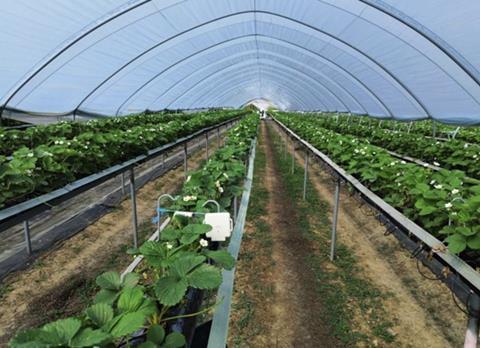The UK pilot-study aims to support smarter research and development for fruit production

UK-based ag-tech company AgriSound has teamed up with Dole to launch a pilot-study into the impact of new growing materials on pollination in fruit production.
The project, launched in April 2025 at Dole’s Charlton site in Langley, Kent, addresses a critical question for the fruit industry: how do advanced growing materials influence pollinator activity and, ultimately, fruit production?
AgriSound said it marks a significant leap forward in data-driven agricultural research, aiming to redefine how fruit producers optimise yield, quality, and environmental sustainability through advanced pollination insights.
The study will investigate the impact of IYRIS (a leading global producer of adaptive agri-climate products) SecondSky thermal reduction polytunnel covers on tunnel microclimates and bumblebee activity, comparing them to industry-standard materials. AgriSound’s cutting-edge Polly sensors will provide real-time pollinator activity data throughout the trial, allowing researchers to precisely quantify the impact on pollination and its direct correlation to fruit yield and quality.
According to AgriSound, the initiative is particularly timely given the substantial investment by UK food and drink manufacturers in research and development activities, which exceeded £800mn between 2021 and 2022, a 13 per cent increase from the previous year.
Fruit producers routinely invest significant resources in developing new berry varieties, trialling packaging formats, and selecting materials such as polytunnel covers to improve yield, quality, and sustainability. To ensure success, such innovations must first be validated in small-scale trials before being rolled out across thousands of hectares. Understanding their impact on pollinators is a vital, often overlooked, element.
Dole said it has long recognised the importance of robust research and has established dedicated research and development sites in the UK where promising technologies are trialled and refined. These efforts allow the company to assess not only the agronomic and economic feasibility of new tools but also their environmental impact, ensuring that the most practical solutions are scaled.
Dr Drew Reynolds, technical & sustainability director at Dole, said: “This project is not just about testing a new material, it’s about understanding the broader ecological and commercial impacts of farming innovations, especially in the fruit industry.
“At Dole, we’re always looking for the opportunity to improve our sustainable practices across our sites. By partnering with AgriSound for this pilot study, we can see the real-time influence of our decision-making when it comes to our standard practices and determine exactly how we can better protect the local ecosystems and pollinators.”
Robin Wilson, pollination specialist at AgriSound added: “Pollination influences every stage of crop production, from fruit quality to overall yield.
“This project addresses a targeted question of how we can create optimal conditions for flower development and effective pollination. By combining advanced sensor technology with real-world, on-farm trials, we’re able to assess how any change in crop or growing conditions impacts pollination. In turn, this will help us to determine whether changes support sustainable, productive agriculture in fruit production.
“Pollination has traditionally been seen as the domain of breeding or academic research, but partner initiatives between tech firms like AgriSound and food producers such as Dole demonstrate their relevance for all companies investing in fruit production. Whether evaluating new growing materials, plant varieties, or environmental management practices, understanding how these affect pollinators is key to long-term success.”
The pilot-study will run through the current season and conclude in October 2025. By bringing together agricultural innovation, ecological monitoring, and real-world commercial insight, Dole and AgriSound said they aim to deliver not just a successful trial, but a model for sustainable innovation for the entire industry.



